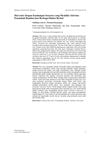 3 citations,
June 2010 in “Pharmacognosy journal”
3 citations,
June 2010 in “Pharmacognosy journal” The polyherbal hair oil effectively reduces dandruff and promotes hair growth.
 January 2022 in “International journal of pharmaceutical sciences review and research”
January 2022 in “International journal of pharmaceutical sciences review and research” Herbal cosmetics are becoming more popular because they are safer, have fewer side effects, and offer health benefits.
 February 1938 in “Journal of the American Medical Association”
February 1938 in “Journal of the American Medical Association” Washing can prevent cancer from lubricating oils, extreme body temperatures need more study, Sulfomid is not recognized, no reliable diphtheria carrier treatment except surgery, eyelid injuries should heal before repair, heterophile antibody test is specific for mononucleosis, chlorine inhalations for colds are outdated, and wheat germ is safe.
 3 citations,
June 2004 in “Alternative and Complementary Therapies”
3 citations,
June 2004 in “Alternative and Complementary Therapies” The document concludes that hair loss is influenced by genetics and other factors, and while treatments like finasteride can help, they have limitations and side effects.
 January 2017 in “Elsevier eBooks”
January 2017 in “Elsevier eBooks” The Christ’s Thorn Jujube tree has many uses, including medicine, food, and industry, due to its beneficial properties.
 3 citations,
October 2007 in “Expert Review of Dermatology”
3 citations,
October 2007 in “Expert Review of Dermatology” Hair ages due to various factors and treatments like minoxidil and finasteride can help, but more research and better public awareness are needed.
 80 citations,
April 2006 in “Clinical Interventions in Aging”
80 citations,
April 2006 in “Clinical Interventions in Aging” Minoxidil and Finasteride are effective for male baldness; more research is needed for hair aging treatments.
 25 citations,
July 2017 in “Archives of Dermatological Research”
25 citations,
July 2017 in “Archives of Dermatological Research” Herbal products might promote hair growth with fewer side effects, but more research is needed to confirm their safety and effectiveness.
 1 citations,
March 2022 in “The Scientific World Journal”
1 citations,
March 2022 in “The Scientific World Journal” The cream made from cocoa pod peel can promote hair growth but may cause skin irritation.
 2 citations,
January 2014 in “Springer eBooks”
2 citations,
January 2014 in “Springer eBooks” The book details skin conditions in older adults, their link to mental health, cancer treatment importance, hair loss remedies, and managing autoimmune and itchy skin.
 December 2013 in “Biomedical and biopharmaceutical research”
December 2013 in “Biomedical and biopharmaceutical research” Nanotechnology shows promise for better drug delivery and cancer treatment.
 59 citations,
January 2015 in “Nanoscale”
59 citations,
January 2015 in “Nanoscale” The new micelle formulation delivers acne treatment more effectively and safely than current gels.
 30 citations,
January 2000 in “Dermatologic Clinics”
30 citations,
January 2000 in “Dermatologic Clinics” Finasteride and minoxidil are effective FDA-approved treatments for androgenetic alopecia.
 April 2017 in “International journal of research in Ayurveda and pharmacy”
April 2017 in “International journal of research in Ayurveda and pharmacy” Ayurvedic methods can help reduce the harmful effects of chemicals in cosmetics.
 1 citations,
January 2017 in “Social Science Research Network”
1 citations,
January 2017 in “Social Science Research Network” The document suggests creating a secure database for indigenous knowledge and recommends that the TKDL actively fight patents that slightly alter traditional knowledge.
 January 2014 in “Journal of Pigmentary Disorders”
January 2014 in “Journal of Pigmentary Disorders” Women's hair gets thinner and grayer as they age, with treatments available for hair loss and graying.
 40 citations,
January 2018 in “Pharmaceutics”
40 citations,
January 2018 in “Pharmaceutics” Eucalyptol and oleic acid in nanoemulsions improve minoxidil delivery to hair follicles, potentially enhancing hair loss treatment.
 April 2014 in “Journal of evolution of medical and dental sciences”
April 2014 in “Journal of evolution of medical and dental sciences” Women over forty can maintain skin and hair health with lifestyle and dietary changes.
 November 2024 in “Journal of Scientific Agriculture”
November 2024 in “Journal of Scientific Agriculture” Silk proteins are great for cosmetics because they protect and improve skin and hair while being eco-friendly.
 73 citations,
July 2016 in “Cosmetics”
73 citations,
July 2016 in “Cosmetics” Mushrooms have beneficial properties for skin and hair care products and have great potential for future cosmetic use.
 January 2017 in “Springer eBooks”
January 2017 in “Springer eBooks” The document explains various skin conditions and their treatments.
 43 citations,
January 2013 in “Indian Journal of Dermatology, Venereology and Leprology”
43 citations,
January 2013 in “Indian Journal of Dermatology, Venereology and Leprology” The article concludes that advancements in hair cosmetics require dermatologists to stay informed about products and their potential risks, including allergies and higher risks for hairdressers.
 1 citations,
July 2022 in “Bandung Conference Series. Pharmacy”
1 citations,
July 2022 in “Bandung Conference Series. Pharmacy” Hair tonic with candlenut oil promotes hair growth and meets quality standards.
 3 citations,
June 2022 in “Dermatology and therapy”
3 citations,
June 2022 in “Dermatology and therapy” A new botanical treatment improved hair growth and symptoms in lichen planopilaris patients.
67 citations,
September 2001 in “American Journal Of Pathology” Inhibiting ODC can prevent UV-induced skin cancer.
 25 citations,
January 2002 in “Folia Pharmacologica Japonica”
25 citations,
January 2002 in “Folia Pharmacologica Japonica” Minoxidil helps hair grow by improving blood flow and increasing growth factors in hair follicles.
 18 citations,
May 2015 in “Australasian Journal of Dermatology”
18 citations,
May 2015 in “Australasian Journal of Dermatology” Serenoa repens extract in topical products improves hair growth and appearance in male pattern baldness with mild side-effects.
 June 2022 in “Journal of Dermatology Research”
June 2022 in “Journal of Dermatology Research” Using 448-kHz Capacitive-Resistive Electrothermal Therapy can help increase hair density and prevent hair loss in women.
 15 citations,
February 2008 in “Annals of plastic surgery”
15 citations,
February 2008 in “Annals of plastic surgery” Most patients were satisfied with diode laser hair removal and experienced no long-term side effects.
 August 2024 in “Frontiers in Nutrition”
August 2024 in “Frontiers in Nutrition” Antioxidant-rich diets may reduce hair loss risk, while pro-inflammatory diets may increase it, especially in women.





























